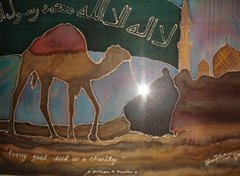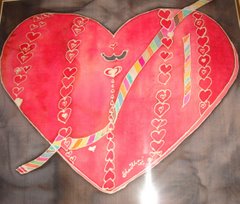
IN-40
Invocation for riding in a vehicle or on an animal
Bismillaah , Alhamdu lillaah . Subhaanal-lathee sakhkhara lanaa haathaa wa maa kunnaa lahu muqrineen. Wa 'innaa 'ilaa Rabbinaa lamunqaliboon . Alhamdu lillaah, alhamdu lillaah, alhamdu lillaah, Allaahu 'Akbar, Allaahu 'Akbar, Allaahu 'Akbar, subhaanakal-laahumma 'innee dhalamtu nafsee faghfir lee, fa'innahu laa yaghfiruth-thunooba 'illaa 'Anta.
With the Name of Allah . Praise is to Allah . Glory is to Him Who has provided this for us though we could never have had it by our efforts. Surely, unto our Lord we are returning. Praise is to Allah. Praise is to Allah. Praise is to Allah. Allah is the Most Great. Allah is the Most Great. Allah is the Most Great. Glory is to You. O Allah, I have wronged my own soul. Forgive me, for surely none forgives sins but You.
Reference: Abu Dawud 3/34, At-Tirmithi 5/501. See also Al-Albani, Sahih At-Tirmithi3/156.
Invocation for traveling
Allaahu 'Akbar, Allaahu 'Akbar, Allaahu 'Akbar, Subhaanal-lathee sakhkhara lanaa haathaa wa maa kunnaa lahu muqrineen. Wa 'innaa 'ilaa Rabbinaa lamunqaliboon. Allaahumma 'innaa nas'aluka fee safarinaa haathal-birrawattaqwaa, waminal-'amalimaa tardhaa, Allaahumma hawwin 'alaynaa safaranaa haathaa watwi 'annaa bu'dahu, Allaahumma 'Antas-saahibu fis-safari, walkhaleefatu fil-'ahli, Allaahumma 'innee 'a'oothu bika min wa'thaa'is-safari, wa ka'aabanl-mandhari, wa soo'il-munqalabi fil-maaliwal'ahli.
Allah is the Most Great. Allah is the Most Great. Allah is the Most Great. Glory is to Him Who has provided this for us though we could never have had it by our efforts. Surely, unto our Lord we are returning. O Allah, we ask You on this our journey for goodness and piety, and for works that are pleasing to You . O Allah , lighten this journey for us and make its distance easy for us . O Allah, You are our Companion on the road and the One in Whose care we leave our family . O Allah , I seek refuge in You from this journey's hardships, and from the wicked sights in store and from finding our family and property in misfortune upon returning.
(Upon returning recite the same again adding :)
'Aa'iboona, taa'iboona, 'aabidoona, Lirabbinaa haamidoon.
We return repentant to our Lord, worshipping our Lord, and praising our Lord.
Reference: Muslim 2/978
Invocation for entering a town or city
Allaahumma Rabbas-samaawaatis-sab'i wa maa 'adhlalna, wa Rabbal-'aradheenas-sab'i wa maa 'aqlalna, wa Rabbash-shayaateeni wa maa 'adhlalna, wa Rabbar-riyaahi wa maa tharayna. 'As'aluka khayra haathihil-qaryati wa khayra 'ahlihaa, wa khayra maafeehaa, wa 'a'oothu bika min sharrihaa, wa sharri 'ahlihaa, wa shard maa feehaa.
O Allah, Lord of the seven heavens and all they overshadow, Lord of the seven worlds and all they uphold, Lord of the devils and all they lead astray, Lord of the winds and all they scatter. I ask You for the goodness of this town and for the goodness of its people, and for the goodness it contains. I seek refuge in You from its evil, from the evil of its people and from the evil it contains.
Reference: Al-Hakim who graded it authentic and Ath-Tfaahabi agreed 2/100, and Ibn As-Sunni (no. 524). Al-Hafidh graded it good in his checking of Al-'Athkdr 5/154. Ibn Baz said in Tuhfatul-'Akhydr p. 37, that An-Nasa'i recorded it with a good chain of narration.
Invocation for entering a market
209. Laa 'ilaaha 'illallaahu wahdahu laa shareeka lahu, lahul-mulku wa lahul-hamdu, yuhyee wa yumeetu, wa Huwa hayyun laa yamootu, biyadihil-khayru, wa Huwa 'alaa kulli shay'in Qadeer.
None has the right to be worshipped but Allah alone, Who has no partner. His is the dominion and His is the praise. He brings life and He causes death, and He is living and does not die. In His Hand is all good, and He is Able to do all things.
Reference: At-Tirmithi 5/291, and Al-Hakim 1/538. Al-Albani graded it good in Sahih Ibn Majah 2/21 and Sahih At-Tirmithi 3/152


